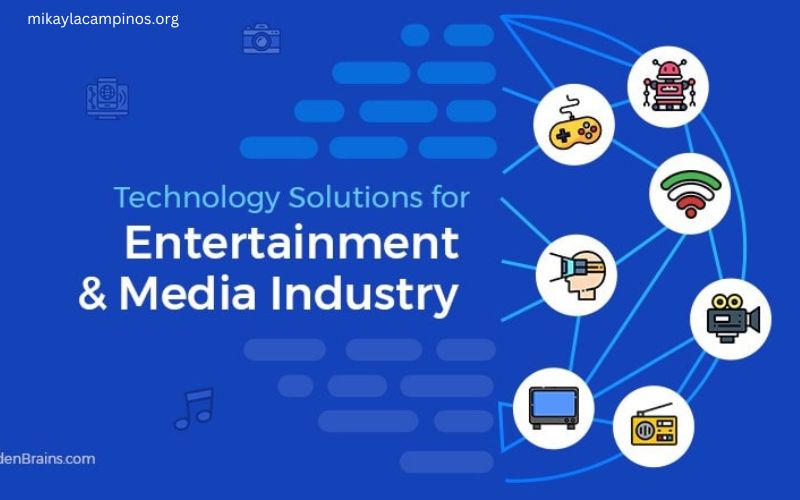The entertainment industry is a vast and ever-evolving realm that encompasses a wide array of activities and mediums designed to captivate audiences through storytelling, performance, and creative expression. It is a global phenomenon that transcends geographical boundaries, cultural divides, and language barriers, uniting people from all walks of life in their shared pursuit of amusement, escapism, and emotional connection.
At its core, the entertainment industry is a tapestry woven from countless threads, each representing a unique form of artistic expression. From the silver screen to the Broadway stage, from the pages of a bestselling novel to the pulsating beats of a chart-topping album, this industry has the power to transport us to realms of fantasy, ignite our imaginations, and evoke a spectrum of emotions that enrich our lives.
In this comprehensive exploration, we will delve into the intricacies of the entertainment industry, tracing its evolution, examining its various sectors, and exploring the profound impact it has had on society and culture.
History and Evolution of the Entertainment Industry
The roots of the entertainment industry can be traced back to the earliest forms of human expression, when our ancestors gathered around flickering fires to share stories, perform ritualistic dances, and engage in primitive forms of theater. As civilizations advanced, so too did the art of entertainment, evolving from simple oral traditions to elaborate spectacles that captivated audiences across the ancient world.
The advent of printing technology in the 15th century ushered in a new era, allowing literature and written works to reach a wider audience than ever before. This paved the way for the rise of the publishing industry and the proliferation of novels, plays, and poetry, further enriching the tapestry of entertainment.
The 19th and 20th centuries witnessed a remarkable transformation as technological advancements gave birth to new forms of entertainment. The invention of photography and motion pictures revolutionized the way stories were told, while the advent of radio and television brought entertainment directly into people’s homes, forever altering the landscape of the industry.
Today, the entertainment industry is a global behemoth, encompassing a vast array of mediums and platforms, from traditional forms like theater, film, and music to emerging realms such as video games, virtual reality, and streaming services. This constant evolution has not only expanded the boundaries of entertainment but has also fostered a vibrant exchange of ideas and cultural influences on a global scale.
Key Sectors of the Entertainment Industry
The entertainment industry is a multifaceted realm comprising numerous sectors, each with its own unique characteristics and contributions. Let us explore some of the most prominent sectors:
- Film and Television: This sector is perhaps the most widely recognized and influential within the entertainment industry. From Hollywood blockbusters to independent films, and from network television series to streaming platforms, the art of visual storytelling has captured the hearts and minds of audiences worldwide.
- Music: The universal language of music transcends cultural barriers and has the power to evoke emotions, inspire movements, and unite people across the globe. The music industry encompasses a diverse array of genres, from classical to contemporary, and encompasses various facets such as recording, live performances, and music distribution.
- Publishing: The written word has long been a cornerstone of the entertainment industry, with books, magazines, and literary works captivating readers for centuries. The publishing sector has adapted to the digital age, embracing e-books and online platforms while continuing to celebrate the timeless art of storytelling through the printed page.
- Theater and Performing Arts: From the grandeur of Broadway to the intimacy of local theaters, the performing arts sector offers a unique and immersive experience that blends live performance with captivating storytelling. This sector encompasses a diverse range of genres, including musicals, plays, dance, and opera.
- Video Games: Once considered a niche pastime, the video game industry has emerged as a cultural phenomenon, transcending its roots as a form of entertainment to become a platform for artistic expression, storytelling, and social interaction.
- Sports and Live Events: The thrill of witnessing live events, whether sporting competitions or concerts, has long been a cornerstone of the entertainment industry. This sector encompasses a vast array of activities, from major league sports to music festivals, providing audiences with unforgettable experiences and shared moments of excitement.
The Role of Technology in the Entertainment Industry
Technology has been a driving force in the evolution of the entertainment industry, continuously reshaping the way content is created, distributed, and consumed. From the advent of motion pictures and television to the rise of digital platforms and streaming services, technological advancements have opened new doors for creativity and accessibility.
The advent of digital technologies, such as computer-generated imagery (CGI) and virtual reality (VR), has revolutionized the filmmaking process, enabling creators to bring their wildest visions to life with unprecedented realism and immersion. Similarly, music production has been transformed by digital recording and editing tools, empowering artists to craft intricate soundscapes and push the boundaries of sonic expression.
The internet and the proliferation of mobile devices have also played a pivotal role in the entertainment industry’s transformation. Streaming platforms like Netflix, Hulu, and Amazon Prime have disrupted traditional distribution models, offering audiences unprecedented access to a vast library of content at their fingertips. Social media platforms have also emerged as powerful tools for content creators, enabling them to connect directly with their audiences, promote their work, and build dedicated fan bases.
Furthermore, emerging technologies like artificial intelligence (AI) and machine learning are poised to revolutionize the entertainment industry in ways we are only beginning to imagine. From personalized content recommendations to the generation of synthetic media, AI promises to reshape the creative process and redefine the boundaries of entertainment.
Impact of the Entertainment Industry on Society and Culture
The entertainment industry’s influence extends far beyond mere amusement; it has the power to shape societal narratives, challenge cultural norms, and inspire movements that transcend the realms of entertainment itself.
Throughout history, the arts have served as a mirror reflecting the complexities of the human experience, often providing a lens through which we can examine societal issues and spark meaningful discourse. From thought-provoking films that tackle social injustice to music that gives voice to marginalized communities, the entertainment industry has played a pivotal role in fostering awareness, empathy, and cultural understanding.
Moreover, the entertainment industry has been a driving force behind various social and cultural movements, serving as a platform for activism and advocacy. From the civil rights movement of the 1960s to contemporary efforts to promote diversity and inclusion, the power of storytelling has been harnessed to challenge prejudices, amplify underrepresented voices, and inspire positive change.
The entertainment industry’s impact extends beyond the realm of social commentary; it has also shaped fashion trends, influenced language and popular culture, and even inspired technological innovations. From the iconic styles of Hollywood stars to the emergence of new dance crazes and catchphrases, the entertainment industry has left an indelible mark on the cultural fabric of societies around the world.
Career Opportunities in the Entertainment Industry
The entertainment industry offers a diverse array of career opportunities, catering to a wide range of talents and interests. From the creative realms of acting, directing, and writing to the technical aspects of production, post-production, and distribution, the industry provides a multitude of pathways for individuals seeking to turn their passions into rewarding careers.
- Creative Roles: These include actors, directors, writers, musicians, dancers, and other artists who bring their creative visions to life on stage, screen, or in the recording studio.
- Production Roles: From producers and cinematographers to set designers and costume designers, the production side of the industry is responsible for bringing creative concepts to fruition.
- Technical Roles: These include roles such as sound engineers, visual effects artists, and animators, who leverage their technical expertise to enhance the overall entertainment experience.
- Business and Management Roles: The industry also offers a wealth of opportunities in areas such as marketing, distribution, talent management, and event planning, catering to those with strong business acumen.
- Emerging Roles: As technology continues to evolve, new roles are emerging, such as virtual reality developers, social media influencers, and content creators for various digital platforms.
While the entertainment industry is often associated with glamour and fame, it also requires immense dedication, perseverance, and a willingness to continuously hone one’s craft. Successful careers in this industry are built on a foundation of passion, creativity, and a relentless pursuit of excellence.
Challenges and Trends in the Entertainment Industry
Like any dynamic industry, the entertainment sector faces its fair share of challenges and evolving trends that shape its trajectory. From technological disruptions to shifting consumer preferences and evolving business models, staying ahead of the curve is crucial for success in this ever-changing landscape.
- Technological Disruption: The rapid pace of technological advancements has disrupted traditional distribution models and challenged established players to adapt or risk obsolescence. The rise of streaming platforms, for instance, has forced major studios and networks to reevaluate their strategies and explore new revenue streams.
- Changing Consumer Preferences: In an era of unprecedented choice and accessibility, consumer preferences are constantly evolving. Audiences demand more personalized, interactive, and immersive experiences, challenging content creators to innovate and deliver content that resonates with diverse audiences.
- Globalization and Cultural Diversity: As the entertainment industry becomes increasingly globalized, there is a growing demand for content that reflects diverse cultural perspectives and resonates with audiences across borders. This presents both opportunities and challenges in terms of storytelling, representation, and navigating cultural sensitivities.
- Piracy and Intellectual Property Rights: The proliferation of digital platforms and the ease of content sharing have exacerbated the issue of piracy, posing significant challenges for content creators and rights holders. Striking a balance between protecting intellectual property and embracing new distribution models is an ongoing challenge.
- Sustainability and Social Responsibility: As awareness of environmental and social issues grows, the entertainment industry is increasingly being held accountable for its practices and impact. Initiatives to promote sustainability, diversity, and ethical practices are becoming increasingly important for companies seeking to maintain a positive public image and resonate with socially conscious audiences.
To navigate these challenges and stay ahead of emerging trends, the entertainment industry must embrace innovation, agility, and a willingness to adapt. Collaboration between creators, technology companies, and industry stakeholders will be essential in shaping the future of entertainment and ensuring its continued relevance and success.
Famous Personalities in the Entertainment Industry
The entertainment industry is a stage upon which countless talented individuals have left an indelible mark, captivating audiences and inspiring generations with their remarkable contributions. From legendary actors and musicians to groundbreaking directors and writers, these personalities have transcended the boundaries of their respective mediums to become cultural icons.
- Actors: Luminaries such as Meryl Streep, Robert De Niro, and Cate Blanchett have mesmerized audiences with their remarkable range and ability to inhabit diverse characters, leaving an enduring legacy in the annals of cinema.
- Musicians: Icons like Michael Jackson, Beyoncé, and The Beatles have not only entertained millions with their music but have also influenced fashion, culture, and social movements, solidifying their status as cultural phenomena.
- Directors: Visionary filmmakers like Steven Spielberg, Martin Scorsese, and Hayao Miyazaki have pushed the boundaries of storytelling, creating cinematic masterpieces that have left an indelible mark on the art form.
- Writers: Literary giants like J.K. Rowling, Stephen King, and Toni Morrison have captivated readers with their powerful narratives, transporting us to realms of imagination and exploring the depths of the human experience.
- Comedians: From groundbreaking comedians like Richard Pryor and Eddie Murphy to contemporary icons like Tina Fey and Dave Chappelle, the art of laughter has been elevated to new heights, bringing joy and social commentary to audiences worldwide.
These personalities, and countless others, have not only entertained us but have also challenged societal norms, sparked important conversations, and inspired generations of artists and creatives to follow in their footsteps. Their legacies serve as a testament to the enduring power of the entertainment industry and its ability to shape culture, provoke thought, and leave a lasting impact on the world.
The Business Side of the Entertainment Industry
While the entertainment industry is often associated with creativity and artistic expression, it is also a multibillion-dollar business that requires astute management, strategic planning, and a keen understanding of the ever-evolving market dynamics.
- Production and Financing: The creation of entertainment content, whether it be films, television shows, or music albums, requires substantial financial investment. Production companies, studios, and record labels play a crucial role in securing funding, managing budgets, and overseeing the entire production process.
- Distribution and Marketing: Once content is created, it must be strategically distributed and marketed to reach its intended audience. Distribution channels include traditional avenues like theaters and physical media, as well as digital platforms like streaming services and online retailers. Marketing campaigns are meticulously crafted to generate buzz, build anticipation, and drive audience engagement.
- Talent Management: The entertainment industry revolves around its talent, be it actors, musicians, or writers. Talent agencies and management companies play a pivotal role in discovering, nurturing, and guiding the careers of these creative individuals, negotiating contracts, and ensuring their clients’ interests are protected.
- Intellectual Property and Licensing: In an industry where creativity is the currency, intellectual property rights and licensing agreements are paramount. Studios, publishers, and content creators must navigate complex legal landscapes to protect their creative works and monetize them through various licensing agreements and merchandising opportunities.
- Data Analytics and Audience Insights: In today’s data-driven world, the entertainment industry is increasingly relying on advanced analytics and audience insights to inform decision-making. From predicting box office performance to tailoring content recommendations, data analysis plays a crucial role in understanding consumer behavior and optimizing business strategies.
While the creative aspects of the entertainment industry capture the public’s imagination, the business side is the engine that drives its success. It is a delicate balance between artistic expression and commercial viability, requiring a combination of creative vision, strategic acumen, and a deep understanding of the ever-changing market landscape.
Conclusion
The entertainment industry is a dynamic and ever-evolving force that has captivated audiences for centuries. From its humble beginnings in ancient storytelling traditions to its current status as a global cultural phenomenon, this industry has continuously adapted and reinvented itself, embracing new technologies, exploring new mediums, and pushing the boundaries of creativity.
As we look to the future, the entertainment industry stands poised to embark on new frontiers, driven by technological advancements, shifting consumer preferences, and a relentless pursuit of innovation. The advent of virtual and augmented reality, artificial intelligence, and immersive storytelling experiences promise to redefine the very nature of entertainment, blurring the lines between reality and fiction.
However, amidst these technological marvels, the core essence of the entertainment industry remains unchanged – the power to evoke emotions, inspire imaginations, and forge connections that transcend cultural and geographical boundaries. Whether through the timeless art of storytelling or the cutting-edge realms of interactive media, the entertainment industry will continue to captivate audiences, challenge societal norms, and serve as a mirror reflecting the complexities of the human experience.
As we navigate the ever-changing landscape of this dynamic industry, one thing remains certain: the entertainment industry will continue to evolve, adapt, and surprise us, leaving an indelible mark on our collective cultural fabric and shaping the way we experience the world around us.
Explore the boundless opportunities within the entertainment industry by pursuing your passion, honing your craft, and embracing the ever-evolving nature of this dynamic realm. Whether you aspire to be a storyteller, a performer, a technician, or a business leader, the entertainment industry offers a vast array of pathways to turn your dreams into reality. Immerse yourself in this captivating world, and let your creativity soar as you contribute to the tapestry of entertainment that continues to inspire, entertain, and unite audiences across the globe.




You have mentioned very interesting details! ps nice site. “We simply rob ourselves when we make presents to the dead.” by Publilius Syrus.